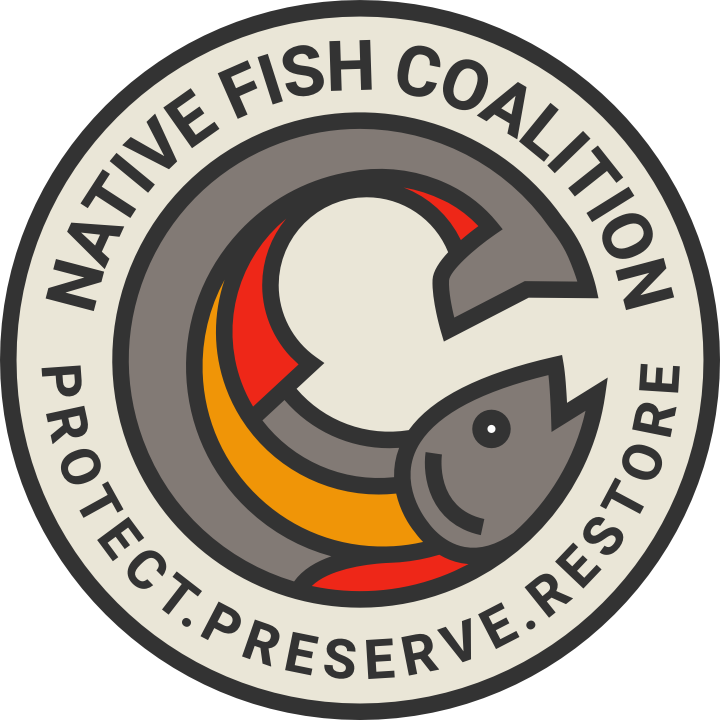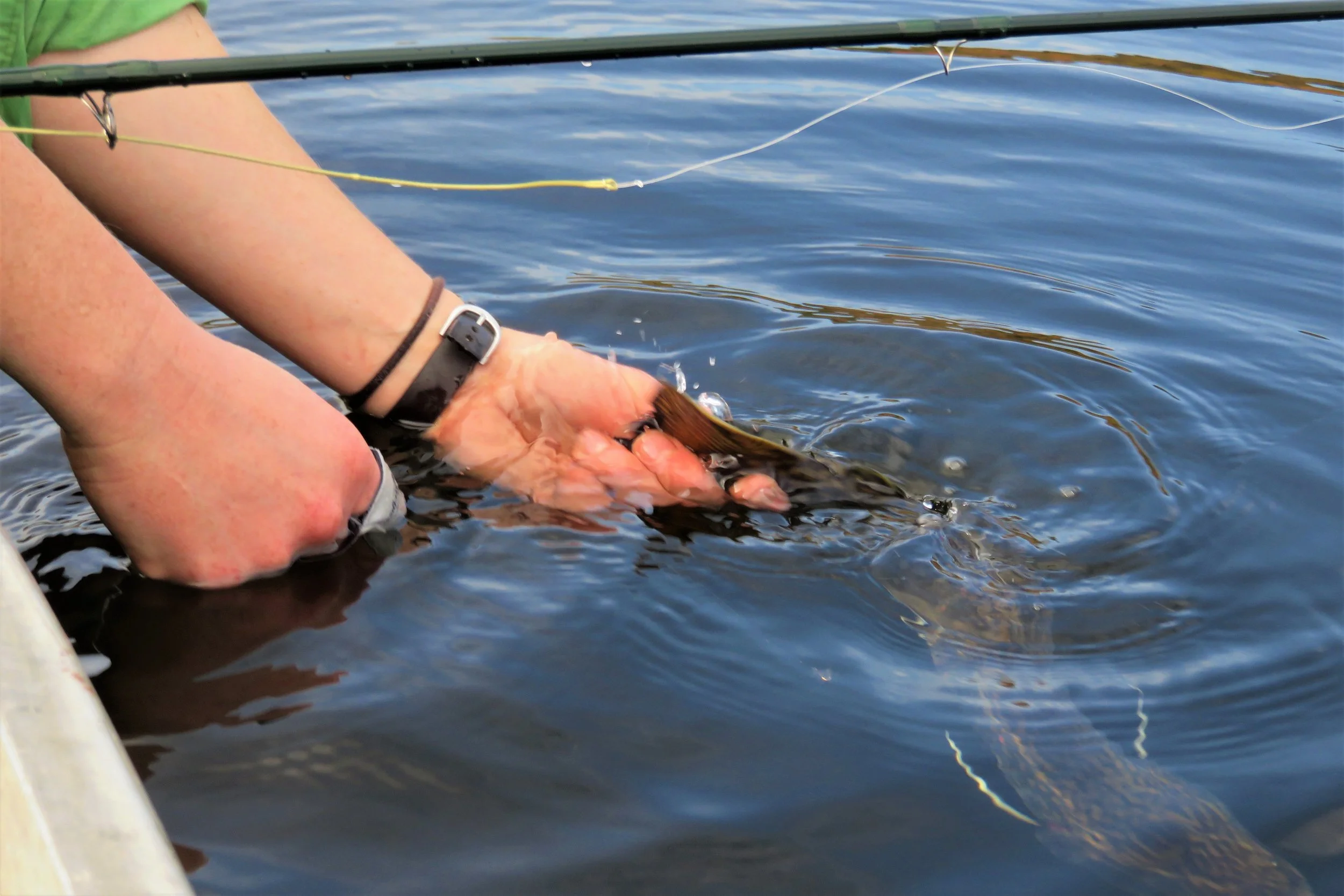NFC Executive Director Bob Mallard Reiterates and Defends NFC's Position in Regard to Harvesting Wild Native Fish...
Releasing a wild native fish helps preserve the population and maintain a natural abundance and age/size distribution…
“Fisheries management involves managing fishermen as much as fish. We push fish resources much further than game resources, using stocking to mitigate over-harvest and demanding more from fisheries than they can sustainably provide...”
NFC Executive Director Bob Mallard recently challenged and rebutted statements made by Maine outdoor writer V.Paul Reynolds in the Bangor Daily News. Like Paul, Bob has an outdoors guest column in the BDN. Reynolds spoke for NFC without any sourced content or quote, or attempt to ascertain the facts. he also dragged TU into it.
Paul, the long-time publisher for Northwoods Sporting Journal and longest tenured currently active outdoor writer in Maine, played the “elitist” card, and accused native fish advocates of judging him and questioning his ethics. Yet, never once have I heard or seen any of these people or organizations challenge what Paul chooses to do with regard to fishing and fish.
“If we only obeyed regulations ‘set by Maine’s professional fisheries biologists,’ our wild native brook trout resources would collapse under aggregate impact as they have previously. Regulations only work because many don’t harvest what the law allows.”
The problem with Paul’s position is that it doesn’t consider the aggregate impact of everyone doing what he does. And it ignores the fact that those in charge have been wrong before, and many times if you dig deep enough. Regulations are set, and changed, based on outside pressure, not biological need. They are influenced by fisheries management theories such as “Maximum Sustainable Harvest.”
“Zero-harvest in regard to wild native brook trout is a voluntary precautionary approach, not a mandate or moral high ground. Releasing fish is what some do to protect the resources they love — it’s selfless, not selfish...”
article as submitted
Native Fish Coalition on Harvesting Wild Native Brook Trout
In a recent article in this publication, V. Paul Reynolds defended harvesting wild native brook trout while challenging those who do not. He played the “ethics” card and spoke for both Native Fish Coalition and Trout Unlimited. While I will not speak for TU, as Executive Director, I will speak for NFC so as not to be misrepresented, and to provide an alternative position for Paul’s.
Ethics is in the eye of the beholder. There are no absolutes, and what’s ethical to one is unethical to another. Ethics is our personal moral compass. It’s what we believe is right or wrong, or good or bad, and subject to interpretation, likes and dislikes, and opinion. To some, not exceeding fish bag limits is ethical. To others, releasing their fish is ethical.
The quote below comes from the FAQ tab on the NFC website. Our publicly documented position on harvesting wild native fish is years old, flexible, and pragmatic. It is hardly, “strongly opposed to the killing and eating of any native brook trout taken from a State Heritage Fish Water.” as Paul stated:
“While we feel prudence is warranted in regard to the harvest of wild native fish, and some species and populations more than others, we are not absolutely opposed to the sustainable harvest of wild native fish. We are however opposed to the harvest of wild native fish when it results in a noticeable decrease or change in population size, geographic distribution, or age/size-class distribution, all of which can negatively impact the population. Harvest can also result in calls for so-called supplemental stocking, which further compromises wild native fish populations…”
I have fly fished for wild native brook trout for decades. It would be fair to say that it’s my favorite thing to do. Like Paul, fishing has provided me with “indelible, precious memories.” I fish because it’s what I love to do. I don’t have to harvest fish to be fulfilled, nor do I. I used to harvest wild native brook trout but stopped to help protect the resource.
Angler harvest is additive not compensatory. It alters the population. Natural abundance and age distribution is the best way to protect fish populations. Short of stopping fishing, not harvesting fish or using high-impact tackle and techniques is the best way to minimize our impact.
While high abundance wild brook trout populations can withstand some level of harvest without being notably degraded, low abundance populations can be severely impacted by harvest. While the fish we harvest may seem inconsequential, the aggregate impact of others doing so as well can be substantial.
Anyone who has fished for wild native brook trout for any length of time has seen the negative impacts of harvest. There is a term in Maine, “fished out,” that has been applied to waters where angler harvest has negatively impacted the fishing for generations. One of my favorite ponds has dropped off notably over the past few years. Angler harvest appears to be the reason.
Maine’s State Heritage Fish law, something I have been intimately involved in since the start, does not protect fish from harvest, just stocking and the dangerous use of live fish as bait. Fewer than 2% of these waters are managed for catch-and-release. Over 40% are open to the use of worms and synthetic bait and managed under a 5-fish bag limit and 6-inch length limit, the least protection provided brook trout under Maine law.
Fisheries management is as much about managing fishermen as it is fish. It’s as much social as it is science. We push fish resources much further than we do game resources, including using stocking to mitigate over-harvest, and trying to get much more out of our fisheries than they can provide.
While NFC discourage harvesting wild native brook trout for biological reasons, that message stops well short of saying that “any angler who harvests a legal limit of native trout from a State Heritage Fish Water is acting unethically.” These kinds of statements undermine the efforts of those who are trying to preserve this unique, fragile, and irreplaceable resource.
The only one guilty of passing “moral judgmental” here is Paul. Zero-harvest in regard to wild native brook trout is a voluntary precautionary approach, not a mandate or moral high ground. Releasing fish is what some do to protect the resources they love. It’s a choice. It’s selfless not selfish.
If all any of us did was obey the regulations “set by Maine’s professional fisheries biologists,” our wild native brook trout resources would collapse under the weight of aggregate impact as they have in the past. The only reason regulations work is that many don’t harvest what the law allows them to take.
As someone who monitors Maine’s fishing regulation, I can say firsthand that they vary radically from one region to the next. Regulations change from conservative to liberal due to public pressure, then back again due to declining fishing. More often than not, regulations are liberalized to promote usage and harvest.
Keeping an occasional wild native brook trout for the frying pan is a small part of a much more complicated issue. The aggregate impact of dozens, or even hundreds of anglers doing so is where it can break down. You don’t have to eat a fish to revere it. I admire each and every wild native brook trout I catch. I just choose to release them to lessen my impact.
I’m not sure why Paul feels he is “greedy” or that his behavior is “beneath some higher ethical standard,” as I don’t see where anyone said that. And practicing zero-harvest and encouraging others to do so does not undermine the idea of conservation. In fact, it encourages and promotes conservation as an alternative personal choice.
Paul’s misrepresentation of NFC and TU only serves to pit sportsman against sportsman. By using terms like “troubled by the message,” “often implied,” “cast moral judgment,” “guilt-tripping,” “purity tests,” etc., Paul unfairly draws negative attention to people who simply see things differently than he does.
Paul should be thankful that many do everything they can to lessen their impact as it benefits the resource and sportsmen alike. While harvesting fish is about values, it’s not about conservation. And when it comes to wild native pond-dwelling brook trout which have been lost throughout most of their native range, including parts of Maine, you can never be too careful...

